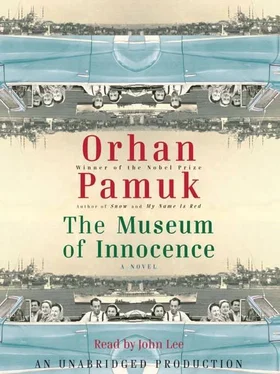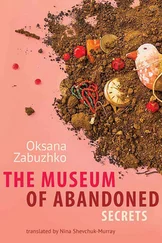Through a travel agency I booked three large rooms at the Hôtel du Nord in Paris, one for me, one for Çetin Efendi, and one for Aunt Nesibe and Füsun. I’d stayed at other hotels in Paris during the years Sibel was at a university, but like a student who dreams of the places he’ll go when he’s rich, I had a fantasy of the happy days I would spend one day in that venerable hotel, which seemed a place out of old films and memories.
“There’s no need for this. Get married and then go,” my mother kept saying. “Come on, if you’re going to travel with the girl you love, why not make the most of it?… Why drag Nesibe and Çetin Efendi there with you? First get married; that way the two of you can fly to Paris and honeymoon by yourselves…I could talk to White Carnation and have the whole thing written up as the sort of romantic story that everyone loves, and then in two days it will be forgotten, yesterday’s news. That old world is gone, anyway. Everywhere you look it’s all parvenus from the provinces.”
For my part, I kept saying: “And how am I supposed to manage without Çetin? Who’s going to drive me around?… Mother dear, you’ve only left the Suadiye house twice all last summer. Don’t worry, we’ll be back before the end of September. When you return to Nişantaşı at the beginning of October, Çetin will be there to drive you, I promise… And Aunt Nesibe will find you a dress for the wedding.”
77 The Grand Semiramis Hotel
ON AUGUST 27, 1984, at a quarter past twelve, Çetin parked the car in front of the house in Çukurcuma, ready to drive to Europe. It had been exactly nine years and four months since Füsun and I had met at the Şanzelize Boutique, but I did not give this coincidence much thought, nor did I dwell upon the ways in which my life and my character had changed in the intervening years. We had been delayed by my mother’s tears and ceaseless flow of advice, and also by the traffic, but none of it could dull my determination to end this chapter of my life and set out on our journey at once. After waiting endlessly for Çetin Efendi to load Aunt Nesibe’s and Füsun’s suitcases into the trunk, I grew outwardly petulant at the sight of smiling, waving neighbors and the children swarming around the car, but inside I felt a pride that I did not wish to acknowledge. As we headed down to Tophane, Füsun waved at Ali, returning from football practice. I told myself that soon Füsun and I would have a child like Ali.
As we drove over the Galata Bridge, we opened the windows, happily breathing in that familiar Istanbul smell of sea and moss, pigeon droppings, coal smoke, car exhaust, and linden blossoms. Füsun and Aunt Nesibe were sitting in the back. I was in front with Çetin-just as in my dreams-and as we drove through Aksaray past the city walls, past one poor neighborhood after another, rumbling over the cobblestone streets, in and out of potholes, I would occasionally throw my arm over the back of the seat and turn around to give Füsun a contented smile.
Outside the city limits, beyond Bakırköy, moving past little factories and depots, new neighborhoods and motels, I caught sight of Turgay Bey’s textile mill, which I’d visited nine years earlier, but now I could barely remember the jealousy that had stung me that day. Once the car had crossed the limits of Istanbul, all the suffering I’d endured for the love of Füsun was suddenly reduced to a sweet story that could be told in one breath. After all, a love story that ends happily scarcely deserves more than a few sentences! Perhaps this is why we became increasingly quiet once we’d left Istanbul behind. Even Aunt Nesibe-though full of mirth at the outset, and asking questions like, “Oh, we didn’t forget to lock the door, did we?” and admiring everything she saw through the window (even the emaciated old nags grazing in an empty lot)-had by the time we’d reached Büyükçekmece Bridge, fallen asleep.
As Çetin was filling the tank at the Çatalca exit, Füsun got out of the car with her mother. After buying a packet of the local fol cheese from an old lady selling her wares beside the road, they went into the teahouse next door, ordered tea and simits to accompany the cheese, and tucked into their makeshift feast. As I sat down with them, it occurred to me that if we continued at this pace, our European tour would last months, not weeks. Did I complain? No! As I sat across from Füsun, silently watching her, I felt the same sweet ache spreading through my chest and my stomach as I’d felt in early adolescence at a dance party, or upon meeting a beautiful girl at the start of summer. It was not the deep and corrosive agony of thwarted love that had once been so familiar, but a requited lover’s sweet impatience.
At 7:40 the sun shone into our eyes before sinking below the line of the sunflower fields. Not long after Çetin Efendi had turned on the headlights, Aunt Nesibe said, “For the grace of God, everyone, let’s not drive in this darkness!”
On the two-lane road the trucks bearing down on us from the opposite direction did not even bother to dim their lights. Just past Babaeski, my eyes were drawn to the blinking purple neon sign of the Grand Semiramis Hotel; it seemed a good place to stop for the night. I asked Çetin to slow down; making a turn in front of Türk Petrol, we heard the dog’s woof, woof, woof warning us off. Çetin stopped in front of the hotel, where my heart began to beat wildly, bursting with feeling, and the awareness that at this place, after nine years of longing, my dreams would come true.
The three-story hotel was quite clean and, except for its name, a modest establishment; the retired army officer at the desk (a cheerful picture of him armed and in uniform hanging above reception) accommodated my request for three rooms, one for Füsun and Aunt Nesibe, one for Çetin Efendi, and one for me. When I found mine, I lay down on the bed and, gazing at the ceiling, it occurred to me that enduring this entire journey while sleeping alone in the room next to Füsun’s might be even worse than having waited nine years.
Later, as she entered the small dining room downstairs, I noticed that Füsun’s manner perfectly befitted the surprise I had prepared for her. It was the sort of entrance one might have made into the sumptuous salon hung with velvet curtains of a grand hotel in some glittering European seaside resort of the nineteenth century: She was beautifully made up and wearing a perfume that I had given her years earlier-Le Soleil Noir (I display the bottle here)-and her lipstick shade matched the red of her dress (also in this exhibit), which brought out the lustrous undertones of her black hair. Sitting at the other tables were tired families-workers returning from Germany; from time to time curious children and lustful fathers would turn around to look at us.
“That red looks lovely on you tonight,” said Aunt Nesibe. “It will look even better in the hotel in Paris, and when we go out. But, darling, don’t wear it every night we’re on the road.”
Aunt Nesibe shot me a look requesting that I second her advice, but no words came from my mouth. It wasn’t merely that, in fact, I wanted her to wear this dress every night, for in it she was so extraordinarily beautiful; it was also that I was as tense as a young lover who, sensing that his happiness is very close at hand, still fears what might go wrong; and so I was struck dumb. I sensed that Füsun, sitting just across from me, felt something of the same anxiety, as she avoided my gaze, and smoked awkwardly as a schoolgirl novice, turning away to exhale.
As we looked over the hotel’s rather plain menu, which had been approved by Babaeski Council, there was a long, strange silence, as if this were the moment to review the last nine years of our lives.
Читать дальше












